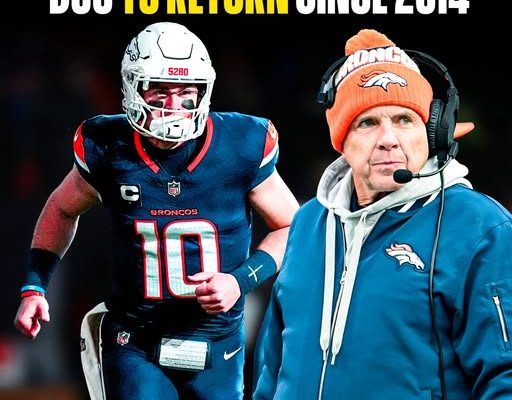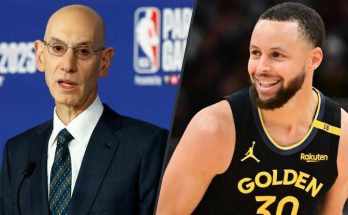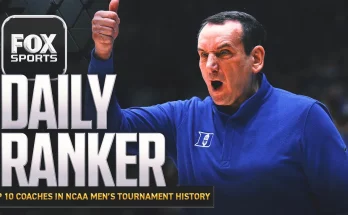The Denver Broncos haven’t had a returning quarterback-head coach duo since Peyton Manning and John Fox in 2014. That’s over a decade of turnover, inconsistency, and frustration for one of the NFL’s proudest franchises. Since that point, the Broncos have cycled through head coaches and quarterbacks alike, unable to establish a stable foundation. From the post-Manning carousel of passers like Trevor Siemian, Paxton Lynch, Case Keenum, Joe Flacco, Drew Lock, Teddy Bridgewater, and most recently Russell Wilson, to the ever-changing leadership with coaches like Gary Kubiak, Vance Joseph, Vic Fangio, Nathaniel Hackett, and now Sean Payton, the Broncos have lacked continuity. That’s finally changing. For the first time in over ten years, the team enters the season with the same quarterback and head coach returning from the previous year: Sean Payton and Jarrett Stidham.
This might not seem monumental at first glance, especially since Stidham only started the final two games of the 2024 season. But in Denver, where the quarterback room has felt like a revolving door and the head coaching position a landmine of one-and-done disasters, it’s a pivotal moment. Sean Payton came to Denver in 2023 with a Super Bowl pedigree, a reputation for quarterback development, and a no-nonsense attitude. What he inherited was a locker room in disarray, an aging and declining Russell Wilson, and a fanbase that had lost faith in the organization’s direction. The 2023 season was turbulent, to say the least. After a rocky start and a brief midseason resurgence, the Broncos missed the playoffs again. The writing was on the wall for Wilson, and by late in the season, Payton made the difficult but decisive move to bench the former Super Bowl champion in favor of Stidham.
Jarrett Stidham isn’t a household name. Drafted in the fourth round in 2019 by the New England Patriots, he spent his early years backing up Tom Brady and later Cam Newton, seeing minimal game action. He was traded to the Raiders in 2022 and made a couple of late-season starts that year, showing flashes of competence. When he signed with Denver in 2023, it was viewed as a depth signing. But Stidham impressed the coaching staff with his command of the offense, calm under pressure, and willingness to prepare like a starter. When Payton made the change, many assumed it was a short-term decision or simply a tactic to send a message to Wilson. But Stidham did more than just manage games—he showed he could move the offense efficiently, make smart decisions, and execute Payton’s complex system with precision.
Now, in 2025, Stidham and Payton have a full offseason together as the confirmed starting duo. For the first time in what feels like forever, the Broncos have a plan—and they’re sticking to it. Stability doesn’t guarantee success, but it’s a necessary ingredient. One of the most overlooked factors in NFL development is consistency in the quarterback-room dynamic. Quarterbacks need time to absorb offensive schemes, develop rapport with teammates, and gain confidence in their leadership role. Coaches need time to tailor game plans to their signal-caller’s strengths. Denver hasn’t had that luxury for years. They’ve been trying to microwave progress instead of letting it simmer. Finally, with Payton and Stidham, the Broncos are showing patience.
The Broncos’ decision to move on from Russell Wilson will define the early legacy of the Payton era. It wasn’t just a football decision—it was a philosophical one. Payton came in and assessed that Wilson was no longer capable of operating within the type of offense he wanted to run. Instead of forcing a square peg into a round hole, he made the rare choice to eat a significant amount of dead cap and start fresh. That’s not a move you make unless you believe the guy replacing him can not only manage the offense but elevate it. While Stidham may not have the resume of a franchise quarterback, Payton’s track record suggests he sees something more. Remember, this is the coach who helped turn an undersized sixth-round pick in Drew Brees into a Hall of Famer. The parallels aren’t perfect, but the faith Payton has in Stidham is telling.
Throughout OTAs and minicamp, reports out of Denver have highlighted Stidham’s command of the offense and quiet confidence. Teammates have raved about his work ethic, film study habits, and steady leadership. Payton, known for being tough on quarterbacks, has consistently praised Stidham’s decision-making and understanding of protections. The 2025 Broncos are being built around a tough, disciplined identity, and Stidham fits that mold. He’s not flashy, but he’s effective. He doesn’t seek headlines, but he commands respect. And most importantly, he has the head coach’s trust.
Beyond the quarterback position, the Broncos are quietly building a roster capable of competing. Their defense, anchored by stalwarts like Pat Surtain II and Justin Simmons, remains among the league’s best. On offense, young playmakers like Marvin Mims Jr., Javonte Williams, and rookie tight end Kyle Dillingham provide upside. The offensive line, long a weak point in Denver, has been shored up through smart drafting and free-agent additions. Most critically, there is alignment now between the front office and coaching staff—something that has been missing for far too long. General Manager George Paton and Sean Payton are working in concert, not conflict.
Expectations for the Broncos in 2025 are cautiously optimistic. They play in a stacked AFC West, with Patrick Mahomes and the Chiefs still looming large and the Chargers boasting a rejuvenated squad under their new regime. But the Broncos are no longer seen as a dysfunctional franchise grasping at quick fixes. They have direction. They have leadership. They have a plan. And that plan centers around continuity—something they haven’t had in over a decade. That’s what makes this season different. It’s not about Super Bowl-or-bust expectations. It’s about laying a sustainable foundation. If Stidham proves he can be the guy, then Denver can finally end its long and painful quarterback search. If he falters, at least he will have been given a fair shot in a stable environment.
There’s also the undeniable fact that Sean Payton is coaching with something to prove. Despite his championship in New Orleans and sterling reputation, many questioned his decision to take on the Broncos’ challenge. The Wilson saga didn’t help. Critics said he’d lost his fastball or that his old-school approach wouldn’t mesh with today’s NFL stars. But Payton is as sharp and competitive as ever. His offense, when executed correctly, is one of the most difficult to defend in football. What he’s trying to do in Denver is create a culture where accountability matters more than celebrity, where preparation is more important than hype. Stidham fits that ethos.
This quarterback-head coach pairing may not have the star power of others across the league, but it might be exactly what the Broncos need. For years, they chased names—whether that was bringing in Flacco for veteran leadership, drafting Paxton Lynch as a project with potential, or mortgaging draft picks for Russell Wilson. Now, they’re embracing fit, trust, and development. The rest of the league should take note. Not every rebuild needs to be dramatic. Sometimes the slow, methodical approach works best. Especially when the foundation is solid.
And fans in Denver are starting to believe again. There’s a quiet confidence building—not the kind born from hype videos and splashy press conferences, but from practices that run efficiently, players who stay late in the film room, and coaches who stick to their convictions. Broncos Country has endured a long and painful stretch. But for the first time in years, there’s a feeling that the franchise is climbing, not spiraling. That doesn’t mean they’ll win 12 games. It doesn’t even mean they’ll make the playoffs. But they’re building the right way. And that process begins with stability under center and on the sidelines.
There’s a poetic symmetry in the Broncos returning to something they once knew: a steady quarterback-coach relationship. It was the hallmark of their most successful eras. Elway and Reeves. Plummer and Shanahan. Manning and Fox. Now, perhaps, Stidham and Payton. Time will tell how far this partnership goes, but the foundation is finally firm. The revolving door has stopped spinning. The pieces are starting to align. And in the brutal world of professional football, sometimes that’s all you need to start winning again.



